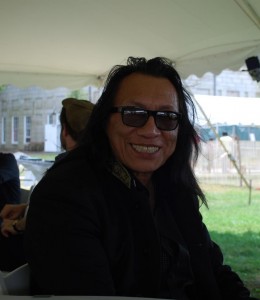 By now you’ve probably heard the story of Sixto Rodgriguez. He recorded two fine albums for Sussex Records in 1969 and 1970, but neither one made any impact on the charts. Rodgriguez backed away from the music scene and went to work doing construction in Detroit. During this time he was politically active and made an unsuccessful run for the Detroit city council. His name was misspelled on the ballot.
By now you’ve probably heard the story of Sixto Rodgriguez. He recorded two fine albums for Sussex Records in 1969 and 1970, but neither one made any impact on the charts. Rodgriguez backed away from the music scene and went to work doing construction in Detroit. During this time he was politically active and made an unsuccessful run for the Detroit city council. His name was misspelled on the ballot.
In the meantime, no one knows exactly how, Rodriguez’ music became immensely popular in South Africa. He was completely unaware of this however, and as far as the South Africans knew, he was dead. Finally, in the late ’90s two intrepid South Africans, Stephen “Sugar” Segerman and Craig Bartholomew Strydom, decided to try to find out how he died, only to learn that Rodriguez was very much alive.
Rodriguez was invited to perform in South Africa and played sold-out venues before adoring fans. Some years later first-time filmmaker Malik Bendjelloul decided to tell the Rodriguez story and the result is the acclaimed documentary Searching For Sugar Man, which will be released on DVD on January 22. This week the film was nominated for an Academy Award for Best Documentary Feature.
The albums that you released in 1969 and 1970 didn’t make much of a dent. What happened to you after that?
I recorded two albums in 1969 and 1970. The record company went under in 1973 and I just left the music scene, but I didn’t leave music. I wasn’t lost, I knew exactly where I was.
Did you continuing writing songs and performing?
Not publicly. I went out but I didn’t perform except for two tours I did in Australia in ’79 and ’81.
How did those tours come about?
There was a disk jockey who started playing me on Triple J. The promoters heard about it and they though I could sell the rooms.
How did the whole situation in South Africa unfold?
I learned about this in 1996 when Stephen Segerman came to the house. He showed me the (South African) CD. In ’98, which is the climax of Malik Bendjelloul’s film, I went to South Africa. It was a wonderful experience. We played 5,000 seaters, and we did six shows. It was epic.
Tell me about Sugar
Stephen Segerman decided to try to find me. They posted something on the Internet and my daughter Eva saw the posting and she got ahold of Sugar. We talked and then I went to South Africa.
Now we have the Searching For Sugar Man documentary
It’s a fun film. I’ve seen it over 25 times now and when my two daughters come on it just makes the whole night. I didn’t have anything to do with the selection of material or anything like that, and I’m only in the film for eight minutes. It won the People’s Choice Award at Sundance.
In the film you see glimpses of the places of apartheid. It also talks about the situation in music, and how that developed.
What do you think your music meant to people in South Africa?
I understand that it was soldiers who defended their country. They have conscription in South Africa, and they had soldiers in Namibia and Angola as well. They would trade cassettes of my material. I’ve met people in the audience and there are a lot of soldiers.
What is the importance of politics in your songwriting?
In America we had conscription and the youngbloods were burning their draft cards, resisting the draft, and moving to Canada. On the orders of the government at Kent State they shot and killed students who were protesting the war. So you would see government repression.
I used the protest song as a genre in music that describes some of this social realism. A lot of music is boy-girl themes. For me the genre of protest songs was set out by Bob Dylan in his “Masters of War,” “Eve of Destruction” by Barry McGuire, “Ohio” by Neil Young, and “I Am A Rock” by Paul Simon. Those songs helped us get through those periods.
What is your hope for the future?
It’s a new century. We have to end the violence, we have to save social security so the youngbloods don’t have to worry about that part of it. There should be more women in government. Guys have proven over and over that they can’t do it, so there should be a new paradigm there and let the ladies who have proven that they are smarter and mature faster have a chance.
I describe myself as a musical political. Knowledge itself is nothing, it’s what you do with it. If a person can’t do anything about it per se at least we can speak to it, which I think is important.
Do we have some new music to look forward to?
I do write. I do write ideas and do guitar riffs. It’s a living art, and I’m constantly turning something new up. But right now what’s in front of me is this film. Sony Legacy and Light in the Attic have put me on the map. These youngblood strangers have excited my musical career.
Searching For Sugar Man – Original Soundtrack
Rodriguez – Coming From Reality
[youtube id=”tDw7OqVBT-w” width=”600″ height=”350″]
Photo by Nicole Vanasse





Comments